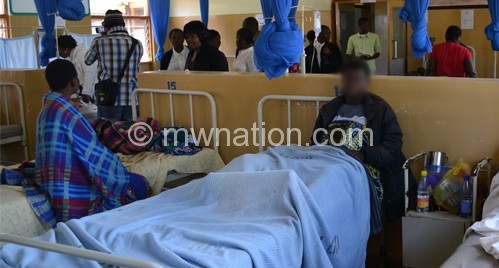Making headway in HIV stigma

Chrissy Stephano, 39, of Ligowe in Neno was diagnosed with HIV, the virus that causes Aids, 13 years ago. Hers is a tale of the rough road people living with HIV (PLHIVs) pass in their quest for a better and healthier life.
A mother of four, Stephano has had to sacrifice her health for that of her children who are also HIV positive because, she claims, medical personnel could only give the life prolonging anti-retroviral (ARV) drugs to one member of her family, despite that each one of them needed their own dosage.
According to the 2012 PLHIV Stigma Index Malawi Country Assessment developed by the Network of People Living with HIV and Aids in Malawi (Manet+), 89.6 percent of PLHIV respondents to the survey indicated that they had children. Out of that 89.6 percent, 23.3 percent had one or more HIV-positive children.
As such, if families are denied access to treatment and ARVs, there can be serious consequences.
In the case of Stephano, the poor service delivery at her local health centre has contributed to the stigma and discrimination that she faced. She recalls a time when PLHIVs in her community used to receive ARVs in an unsuitable environment.
“This area did not have a health centre until 2005, when we in the community decided to build one. The building was opened in June 2013 and for a long time; services and treatment of patients were done at the Hunger Project building within the area,” she says.
But at times, the borrowed premises were used by the owners, which would result in drugs and various services being administered in open air.
“Some community members would laugh at us, PLHIVs, when we queued outside waiting to receive ARVs and get weighed. Some would even refuse to step on the scale, saying they were afraid of getting the virus,” says Stephano.
The 2012 stigma index of PLHIVs shows that Stephano’s case is not isolated. Nearly half of respondents (48.4 percent) reported that they had been gossiped about based on their status at least once as of 2011. A significant 35.1 percent of respondents also reported having been verbally insulted, harassed and threatened while 33.7 percent reported being excluded from social gatherings.
For Stephano, however, life maybe lighting up after the training that Malawi Health Equity Network (Mhen) conducted in her community recently.
“We were told to fight for better service delivery and speak out against any form of discrimination and stigma. So far, we held a meeting with Traditional Authority Mlauli who advised all village heads to include us in the Farm Input Subsidy Programme (Fisp). The issue of administering drugs to only one member of the family has also been sorted because we informed the district health officer and the media who fought vigorously against it,” says Stephano.
Mlauli has, since the advocacy by PLHIVs in the area, introduced by-laws against HIV-related stigma and discrimination. Any offender is fined to pay a goat to the chief. This has resulted in a more conducive environment for PLHIVs.
The chief says they have intensified awareness messages among village heads after PLHIVs called for better care and involvement in developmental activities.
“We tell them that being HIV positive does not mean one is dead. Admittedly, PLHIVs did not receive Fisp coupons before, but since the meeting all chiefs are now including them, which is a positive stride against HIV stigma and discrimination,” said Mlauli.
Mhen embarked on the sensitisation project following increased reports of HIV stigma and discrimination and lack of proper health care to PLHIV. The five year project—from 2011 to 2016— aims at increasing access to treatment and accountability for PLHIVs.
Mhen project manager Lloyd Mtalimanja says the project has improved lives of people like Stephano who would have been suffering in silence. So far, it is being implemented in four districts—Mangochi, Neno, Chikhwawa and Nkhata Bay, all of which have made positive strides, according to Mtalimanja.
“Our training has had a positive impact. The health centre in Ligowe has also been opened which is helping PLHIVs receive medication in a private and respectable environment, thereby respecting their right to confidentiality,” says Mtalimanja.
While the story of Stephano may have a happy ending, statistics of PLHIVs being stigmatised and discriminated against show there is a lot to be done to achieve the three zeros target set by UNAids in the fight against HIV and Aids which are zero discrimination, zero new infections and zero HIV-related deaths.





